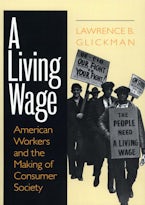A Living Wage is an important book that challenges the view of pure and simple unionism as apolitical. It also calls into question where, when, and why Americans first embraced a consumer identity.... A fascinating study of the rise of a consumer-oriented working-class ideology.
~Journal of American History
A very fine, well-written study of changes in rhetoric and ideology, as well as a lucid discussion of what these changes tell us about the goals of working-class leaders, thinkers, and reformers. Glickman's study is less about wage labor and consumption than about changing notions of and perspectives on these issues. As such, A Living Wage is a valuable contribution to the history of working-class culture, rhetoric, and ideology in the late nineteenth and early twentieth centuries.
~Industrial and Labor Relations Review
Glickman makes a bold contribution to the wider task of rethinking the late nineteenth-century labour movement, and his findings deserve wide notice.
~Labour History Review
Glickman provides an entirely new way of understanding working-class material demands.
~Reviews in American History
Glickman's lively and thoughtful intellectual history of the concept of a living wage speaks both to historians of American working people and to historians of Amercan culture.... His primary method is discourse analysis, and he does it very well.... He writes clearly and evocatively, with sensitivity to gender and race, as well as class.
~Journal of Social History

